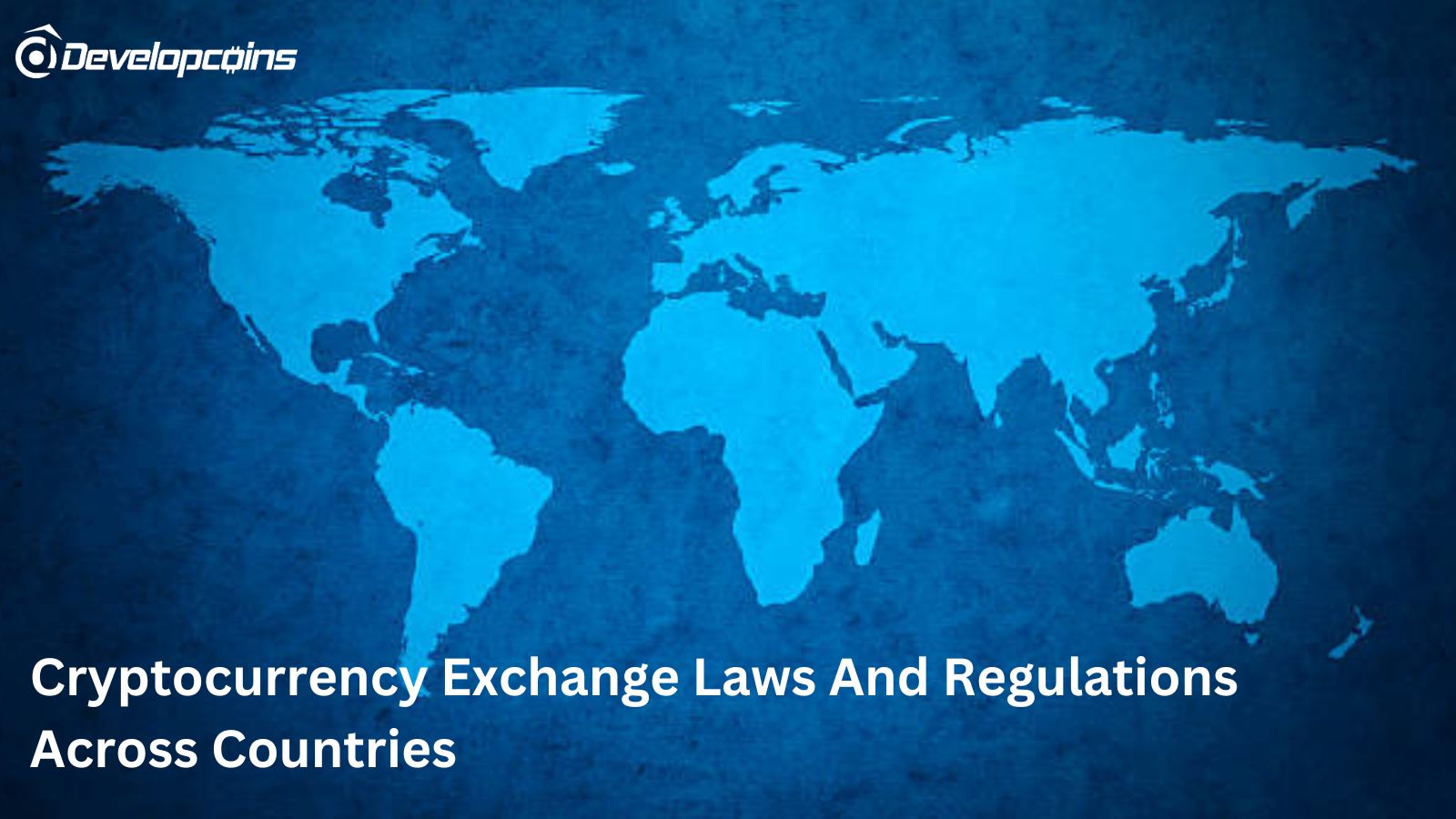

This blog lets you understand the diverse landscape of cryptocurrency regulations across the globe, along with their legislative stances and related operations.

As the usage of cryptocurrency is enhanced, hence its regulations throughout the world are put in place to govern them. Hence, it is not quite easy to constantly evolve and keep up to date with the rules in global territories.
This blog lets you understand the diverse landscape of cryptocurrency regulations across the globe, along with their legislative stances and related operations. It's time to learn how various nations fixed their coin and exchange regulations along with the laws and regulations before starting your own crypto exchange in your desired country.
Cryptocurrencies: Not a legal tender
Cryptocurrency Exchanges: Legal, but regulations vary from state to state
Cryptocurrency exchanges are legal in the United States as they operate within the legal framework established by the Bank Secrecy Act (BSA). This symbolizes that the crypto exchange service providers must complete the registration with FinCEN, organize an AML/CFT (Anti-Money Laundering/Combating the Financing of Terrorism compliance) program, maintain proper records and handle reports to the authorities. Also, the US Securities and Exchange Commission (SEC) has conveyed that it considers cryptocurrencies as securities, leading to the comprehensive application of securities laws for digital wallets and exchanges.
Contrastingly, The Commodities Futures Trading Commission (CFTC) follows a friendlier, “do no harm” approach that describes Bitcoin as a commodity and lets cryptocurrency derivatives to trade publicly
In response to the guidelines delineated by the Financial Action Task Force (FATF) in June 2019, FinCEN has provided unambiguous clarity on its expectations for cryptocurrency exchanges to adhere to the "Travel Rule." This necessitates collecting and sharing pertinent information about the initiators and beneficiaries of cryptocurrency transactions. Importantly, virtual currency exchanges fall within the same regulatory category as conventional money transmitters, subjecting them to analogous regulations stipulated in the Bank Secrecy Act. This regulatory framework has established its own version of the Travel Rule.
Of notable significance, in October 2020, FinCEN took a consequential step by issuing a Notice of Proposed Rulemaking (NPRM) concerning adjustments to the Travel Rule. This move signaled the potential introduction of fresh compliance obligations for cryptocurrency exchanges, underscoring an ongoing commitment to refine and enhance the regulatory landscape governing the realm of cryptocurrencies.
Cryptocurrencies: Not legal tender
Cryptocurrency Exchanges: Legal, must register with the Financial Supervisory Service (FSS)
Cryptocurrency exchange regulations in South Korea have a strict framework that requires government registration and oversight by the South Korean Financial Supervisory Service (FSS). However, as per the 2017 regulation, the South Korean government banned the usage of unauthorized accounts and prohibited local financial institutions from facilitating trades involving Bitcoin futures. Moreover, the Financial Services Commission (FSC) requires strict reporting mandates on banks to maintain accounts for crypto exchanges.
The landscape evolved further in March 2021 when the South Korean government introduced legislation that mandates cryptocurrency investors to employ matching names on their virtual wallet accounts and bank accounts. This legislation compels cryptocurrency exchanges to collaborate with banks in order to verify the identities of their customers. Additionally, the FIU took action in 2021 to delist privacy coins from South Korean exchanges,
Following legislative amendments in 2020, all South Korean exchanges must comply with AML/CFT regulations and obtain an operating license from the Financial Intelligence Unit (FIU) of the Financial Services Commission. In March 2021, the South Korean government introduced legislation that requires cryptocurrency investors to use the same name on their virtual wallet accounts as they do on their bank accounts. Such bank demands cryptocurrency exchanges to share information with them to verify customer identities. The FIU also delisted all privacy coins from South Korean exchanges in 2021 thereby banning the trading of these tokens effectively.
Cryptocurrencies: Not legal tender
Cryptocurrency Exchanges: Legal, Requires registration requirements with FCA (Financial Conduct Authority)
In the United Kingdom, the nation classifies cryptocurrency as property rather than legal tender since there are no cryptocurrency-specific laws. Crypto exchanges must complete registration with the U.K. Financial Conduct Authority (FCA). Notably, the U.K. has also instituted a prohibition on crypto derivatives trading. The regulatory framework includes distinct reporting prerequisites pertaining to Know Your Client (KYC) protocols, anti-money laundering (AML) measures, and efforts against the financing of terrorism (CFT).
In terms of taxation, investors remain subject to capital gains tax on profits derived from cryptocurrency trading. However, the taxation scope hinges on the specific crypto activities undertaken and the parties involved in the transactions.
Providers of cryptocurrency exchanges and custodian wallets are obliged to meet the reporting responsibilities established by the Office of Financial Sanctions Implementation (OFSI). In cases where crypto firms possess knowledge or justifiable suspicion regarding an individual being subjected to sanctions or being involved in a financial sanctions offense, they are obligated to expeditiously inform the OFSI.
Cryptocurrencies: Not recognized as legal tender
Cryptocurrency Exchanges: Permitted, mandated to register with FinTRAC following June 1, 2020
Similar to the evolving landscape in the United States, the regulatory framework for cryptocurrencies in Canada is still undergoing development. As in the U.S., Canadian regulatory authorities do not confer legal tender status upon cryptocurrencies, treating them more akin to commodities in terms of taxation.
In such cases, Canadian regulators classify cryptocurrencies as securities but such determinations are typically done on a case-by-case basis. Additionally, the crypto exchanges require registration with the Financial Transactions and Reports Analysis Centre of Canada (FINTRAC) like how crypto investments must similarly register with the government. It is noteworthy that the Toronto Stock Exchange hosts a variety of crypto exchange-traded funds (ETFs).
Cryptocurrencies: Legally recognized as property
Cryptocurrency Exchanges: Legally permitted, mandatory registration with AUSTRAC
Australia specifies cryptocurrencies as legal property, making them subject to capital gains tax regulations. Cryptocurrency exchanges are authorized to operate within the country, followed by registration with the Australian Transaction Reports and Analysis Centre (AUSTRAC) and compliance with specific Anti-Money Laundering (AML) and Counter-Terrorism Financing (CTF) obligations.
In 2019, the Australian Securities and Investments Commission (ASIC) unveiled regulatory prerequisites for initial coin offerings (ICOs). It prohibited exchanges from offering privacy coins, a category of cryptocurrencies that ensure anonymity by concealing the movement of funds across their networks.
In 2021, Australia declared plans to create a licensing framework over cryptocurrency and potentially launched a central bank digital currency (CBDC).
Cryptocurrencies: Not recognized as legal tender
Cryptocurrency Exchanges: Legally permissible, mandatory registration with the Monetary Authority of Singapore
Similar to the United Kingdom, the nation of Singapore designates cryptocurrency as property rather than legal tender. The country’s Monetary Authority of Singapore (MAS) privileges and handles exchanges as outlined in the Payment Services Act (PSA).
Singapore has earned its status as a cryptocurrency safe haven due to the absence of taxation on long-term capital gains.
Nevertheless, businesses engaged in regular cryptocurrency transactions are subject to taxation, with gains treated as income.
Cryptocurrencies: Permitted, restrictions on member-states launching their own cryptocurrencies
Cryptocurrency Exchanges: Regulatory framework varies across member states
Cryptocurrency remains legal across the majority of the European Union (EU), although the governance of exchanges is subject to the regulations of individual member states. Concurrently, taxation policies diverge from one EU country to another, encompassing rates that span the spectrum from 0% to 50%.
Notably, the EU's Fifth and Sixth Anti-Money Laundering Directives (5AMLD and 6AMLD) have recently taken effect to amplify obligations regarding Know Your Customer (KYC) and Combating the Financing of Terrorism (CFT) measures, along with standard reporting requisites.
In September 2020, the European Commission proposed the framework Markets in Crypto-Assets Regulation (MiCA), designed to bolster consumer safeguards, outline appropriate conduct within the crypto industry, and introduce novel licensing prerequisites. This proposal reached a provisional agreement in 2022.
Subsequently, in April 2023, the Parliament sanctioned measures that empower legislation mandating specific crypto service providers to obtain an operational license. This legislative move aims to equip regulators with the necessary tools to monitor instances of cryptocurrency exploitation for money laundering and the funding of terrorism.
Cryptocurrencies: Not legal tender
Cryptocurrency Exchanges: Illegal
In June 2021, China prohibited all domestic cryptocurrency mining activities, and this led to a comprehensive ban on cryptocurrencies in September 2021. This new regulation effectively rendered the utilization of all cryptocurrency exchanges, both foreign and domestic leading to a significant sell-off of tokens. While domestic cryptocurrency exchanges are universally prohibited in China, certain workarounds exist through the utilization of specific foreign platforms and websites that manage to evade China's internet firewall.
Cryptocurrencies: Not Legal Tender.
Cryptocurrency Exchanges: Illegal, Must register with the Brazilian Securities
Bitcoin is not considered legal tender in Brazil; nonetheless, the nation has enacted legislation that legitimizes cryptocurrencies as accepted forms of payment, to enable the wider adoption of digital currencies. Brazil's Chamber of Deputies greenlit a regulatory framework on November 29, 2022, which formally sanctions the utilization of cryptocurrencies as viable payment options within the country.
It's important to clarify that the legislation doesn't confer legal tender status upon cryptocurrencies in Brazil. Instead, the bill incorporates digital currencies and air mileage programs within its definition of accepted payment methods. Following its implementation, the executive branch of the government will determine the specific office responsible for overseeing the enforcement of this law. It's noteworthy that tokens classified as securities will continue to fall under the jurisdiction of the Brazilian Securities and Exchange Commission (CVM).
Cryptocurrencies: Legally recognized, categorized as property
Cryptocurrency Exchanges: Authorized, requisite registration with the Financial Services Agency
Japan demonstrates a forward-thinking stance toward cryptocurrency regulations by acknowledging them as legitimate property within the framework of the Payment Services Act (PSA). Cryptocurrency exchanges operating in Japan are required to undergo registration with the Financial Services Agency (FSA) while upholding Anti-Money Laundering (AML) and Combating the Financing of Terrorism (CFT) commitments. Notably, Japan established the Japanese Virtual Currency Exchange Association (JVCEA) in 2020, encompassing all cryptocurrency exchanges as its members.
The nation has been actively engaged in refining various aspects of cryptocurrency regulation, including its taxation policies. In September 2022, the government unveiled intentions to introduce remittance regulations, potentially implemented as early as May 2023, with the primary objective of curtailing the exploitation of cryptocurrency exchanges for money laundering activities by criminals. To this end, amendments to the Act on Prevention of Transfer of Criminal Proceeds will be made, requiring the collection of customer information.
Hope, now you have gained some knowledge about the laws and regulations to consider before creating your own cryptocurrency exchanges in the above-mentioned countries. Are you a cryptopreneur seeking to launch your own cryptocurrency exchange that apt to your preferred country's regulations? Then reach out to the leading Cryptocurrency Exchange Development Company, Developcoins.
We provide the best cryptocurrency exchange development services as per the clients’ requirements that fit the regulations of the country they desire to launch. With years of industry experience and skilled professionals, we have delivered the best in class crypto exchange solutions throughout the globe. It’s time to build your crypto exchange platform with us now!
Call/Whatsapp: 9500766617
Email: sales@developcoins.com